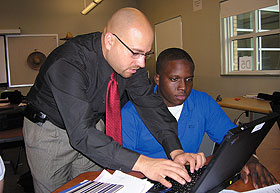  |
| HOME | THIS ISSUE | CALENDAR | PATENTS | BACK ISSUES | < BACK | NEXT > |
Education professor works to attract students of color into teaching by Joanne Nesti - November 10, 2008 | ||||
| “Se hace camino al andar,” Jason Irizarry likes to say, quoting the Spanish poet Antonio Machado. “You make the path by walking it.” That’s more than just an expression for the assistant professor of curriculum and instruction in the Neag School of Education. It has been a guiding force on his path from a housing project in New York City to a gifted and talented program in elementary school to college and then graduate school. Overcoming obstacles “My father was absent for much of my childhood,” he says. “Still, I felt very blessed to have wonderful relatives, including an aunt who was the only college graduate in my entire family.” Spending summers with her, Irizarry recalls that she wouldn’t allow him to go out to play until noon, so they could spend the morning on school work sheets and other drills. “You have to make it,” she would tell him. “So I worked really hard,” Irizarry says, “but also the sun, moon, and stars had to align in order for that to happen, and we can’t base educational policy on luck.” Irizarry’s memories of his years at Cathedral Prep, a high school seminary in Elmhurst, New York, include a constant struggle to navigate the school and neighborhood context, which were often at odds. There were times when he was disciplined for speaking non-standard English at school, while at other times, his language and diction were criticized by friends in the neighborhood for being “too white.” “Traversing all these different circumstances can be a herculean task for urban students,” he says, “but schools can do more to help.” Reaching out to students of color It certainly matters now, as he works to attract more students of color into the teaching profession. A major focus of his current research is an initiative he calls Project FUERTE (Future Urban Educators Conducting Research to Transform Teacher Education). Last year, it was based at the Metropolitan Learning Center, a magnet school in Bloomfield; this year it involves students from Windham High School.
“The FUERTE students and I ask questions that stem from personal experience,” he says, “search for answers, and develop research-based recommendations that we hope will improve the quality of teaching and learning in urban public schools.” Irizarry’s team of high school researchers has found that urban students want school to be a challenging environment that is also caring, nurturing, and supportive. They also want a curriculum they can relate to, just as he did in elementary school when, he says, his mother had to spank him to get him to read the Judy Blume book, Freckle Juice: “I said, ‘Who cares about freckles? I’m the furthest thing in the world from freckles.’” It was his first exposure to works by Puerto Rican authors that really connected him to the content of school. “It wasn’t until I started to engage with some of that literature,” he says, “that I started to recognize that I liked reading, I liked learning. It turned on a light for me.” Boosting academic achievement “My hope is that they’ll get the skills they need to increase academic achievement,” he says, “but also that they’ll consider teaching as a platform for bringing about the social change that we speak of in class.” His work has brought him many honors, among them a recent National Council of Teachers of English ‘Cultivating New Voices Among Scholars of Color’ Fellowship. Irizarry is optimistic about the future of education. “I’m hopeful that schools can be a place of liberation, where students can dream and develop the skills to achieve those dreams,” he says. “We can teach kids. We can have a more egalitarian society. I can imagine different futures for young people. They’re going to change the world.” |
| ADVANCE HOME UCONN HOME |

